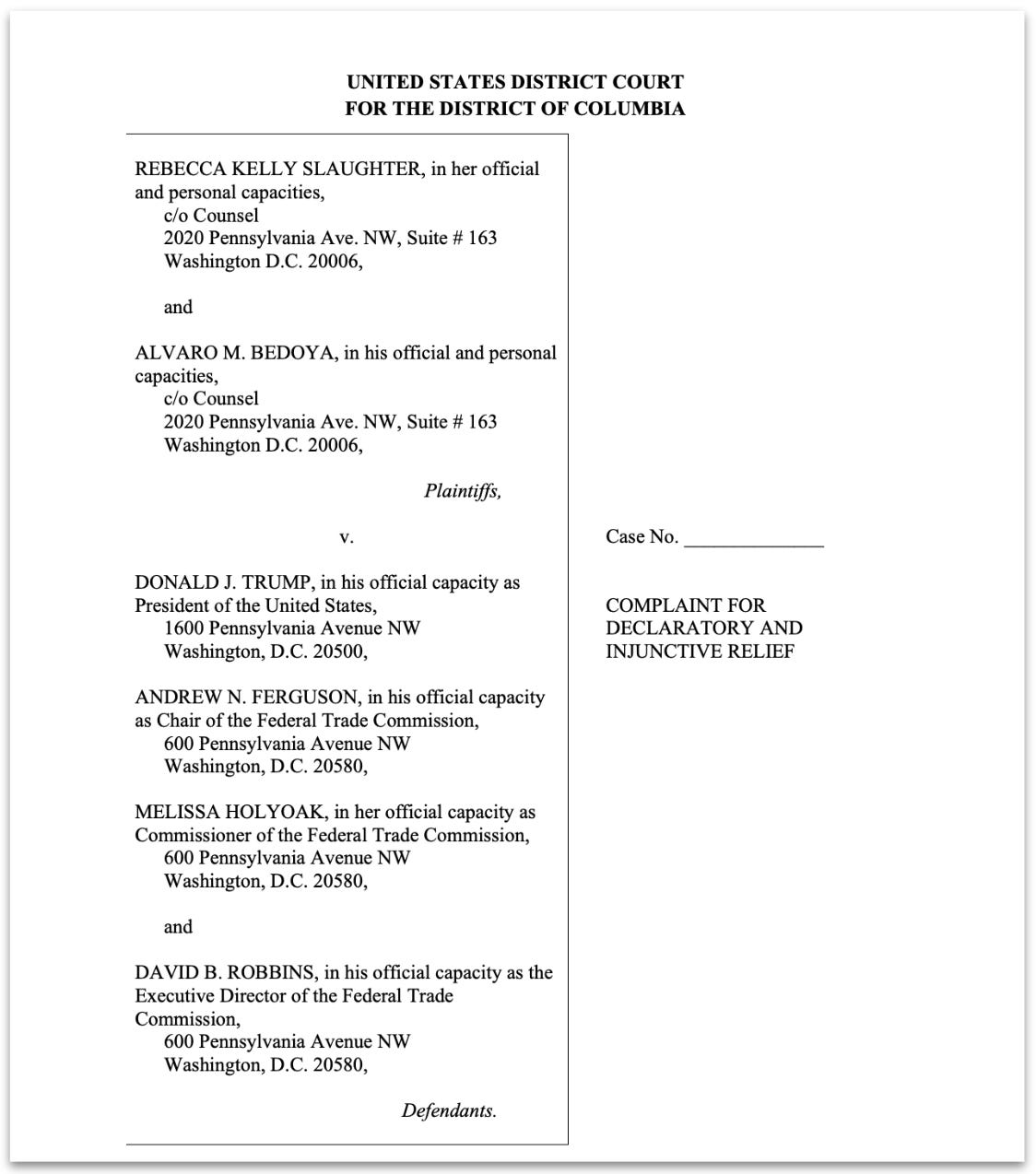Today, FTC Commissioners Rebecca Kelly Slaughter and Alvaro M. Bedoya filed a lawsuit against the Trump administration after the president attempted to fire them without cause. This move directly violates a federal statute, as well as 90 years of binding Supreme Court precedent that protects the FTC — and other independent agencies like the Federal Reserve — from political interference.
The lawsuit seeks to stop this illegal action and preserve the FTC's independence, ensuring it continues to serve the public without undue political pressure, which is precisely what Congress intended.
Read their lawsuit here.
For both Slaughter and Bedoya, this comes down to fighting for the commission’s critical work of protecting everyday Americans and small businesses. Commissioner Bedoya pointed out how the FTC blocked a major grocery store merger that would have raised prices for consumers. Commissioner Slaughter emphasized that the FTC helps stop scams, prevents monopolies, and forces tech companies to protect kids' privacy. As Slaughter described:
The lawsuit argues that the president’s actions are illegal and violate long-standing legal protections for independent agencies like the FTC and the Federal Reserve. Congress created the FTC in 1914 (a year after creating the Federal Reserve) to protect Americans from unfair, deceptive, and fraudulent business practices. Congress specifically barred presidents from firing commissioners without cause to prevent undue political influence.
In 1935, the Supreme Court unanimously decided that a president cannot fire an FTC commissioner without cause. Yet, despite 90 years of Supreme Court precedent, the Department of Justice has decided that the landmark Humphrey’s Executor case — affirming the FTC's independence — is no longer binding.
What happens if Trump succeeds?
The law is clear: The president cannot fire an FTC commissioner without cause.
Allowing this move to stand would give future presidents, Democrat or Republican, the power to silence critics, advance the interest of donors over the American people, and manipulate the economy for political gain. This fight is about more than the FTC — it's about protecting the rule of law, defending the separation of powers, and ensuring that independent agencies, like the FTC and the Federal Reserve, pursue their critical work to advance the welfare of all Americans, as opposed to prioritizing the interest of political partisans and donors.
As Ori Lev described last year, the politicization of independent economic institutions — ones like the FTC or Federal Reserve — has been a disaster in autocratizing countries:
Turkey’s counter-intuitive approach to fighting inflation under strongman Recep Tayyip Erdoğan had a devastating impact on the value of its currency. And Erdoğan’s repeated firings of central bank governors — one of the moves that Trump inquired about and that his allies are mulling over — similarly hurt the local currency and foreign investment.
In Venezuela, Hugo Chavez's rubber stamp assembly enabled him to take over the Central Bank in 2007 — barely eight years after the Bank secured its independence. Confirming economists’ fears, by 2014 inflation was among the highest in the world, eventually rising to 2,000,000 percent (not a typo, two million percent).
In all these cases, autocrats have shown a willingness to wreck their national economies by focusing on shoring up political support — and thus increasing power — in the short run. But, as the Washington Post’s Catherine Rampell writes, “what seems politically smart in the short run is not always good in the long run.”
Donald Trump’s administration is not just violating the law. He is flirting with economic disaster. These attempted firings must not be allowed to stand.
Learn more about this case here.








